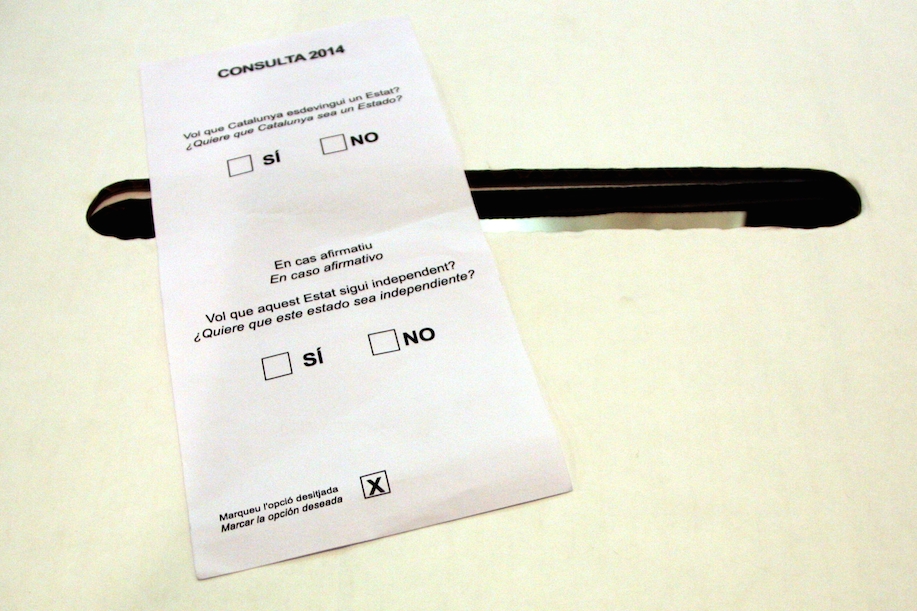25.09.2014 - 14:46
The call to the consultation of 9 November on the independence of Catalonia is imminent. President Artur Mas will call the vote once the law on consultations passed last Friday in Parliament by 106 votes in favour and 28 against has been published in the Official Gazette of the Government of Catalonia (DOGC). From the moment when Mas signs, a series of political and legal actions will be unleashed that we will try to describe in the following:
What will the Spanish government do?
The cabinet will meet extraordinarily and urgently to challenge the law on consultations passed last Friday by the Parliament of Catalonia and President Artur Mas’s decree on the basis of unconstitutionality. This decision has long been announced by several Spanish ministers. In fact after the passing of the law on consultations in the Parliament of Catalonia, the government has a fast plan of action that it will start up as soon as Artur Mas, the president of the Government of Catalonia, calls the consultation. The urgency of the decision is intended to prevent the Catalan institutions from having time to start up the machinery of the consultation and the pertinent campaign.
When will the Spanish government make the challenge?
Once the decision has been taken to appeal to the Constitutional Court to challenge the law and the call for the 9-N, the Spanish government has to ask for a report from the State Council, which can also meet urgently, and must order the corresponding procedure with the state attorney, who is responsible for bringing appeals to the court register, which is open from 9:30 a.m. to 3 p.m. from Mondays to Fridays. There is also the option of bringing the appeal before the night court of Madrid in an emergency procedure which is usually made when the term for making an appeal has ended, which is not the case here.
What would be the consequences of the Spanish government lodging an appeal for unconstitutionality?
The law on consultations and the call for the 9-N will be automatically and provisionally suspended without any need for justification when the appeal is admitted to proceedings. The Spanish government has already announced that it would call for the precautionary suspension of the law and the call. In order to admit appeals made by the Spanish government to proceedings, the twelve court magistrates must meet in a plenary session.
When will the Constitutional Court meet?
The decision on the consultation presented urgently by the Spanish government will probably be the first point on the agenda of the next plenary session of the court, for which a date has not yet been set. It cannot be discarded that the court might meet urgently when the request for suspension is received from the Spanish government.
What will be the effects of the suspension of the law and the decree on the call?
The basic law of the Constitutional Court states that the precautionary suspension has to be reviewed after five months of being brought in. If the court should see fit, it may either extend the suspension or lift it. The precautionary suspension is not a decision on the basis of the request from the Spanish government and may be extended until the court finally resolves on the question, but the suspension does not mean that the law and the call have been declared unconstitutional. In any case, the law and the call may be declared unconstitutional when the court has prepared and passed the sentence. In the meantime, the law and the decree will only be suspended, not illegal.
What can the Catalan government do?
The Constitutional Court will inform of its decision to admit to proceedings and precautionarily suspend the law (to the Parliament) and the decree to call (to the Government of Catalonia), calling upon them to appear in the proceedings within a maximum time of fifteen days. The two institutions must make the allegations they see fit within this maximum time. From then on, the government and the parliament will be considered a direct party in the legal conflict and may defend the validity of the two political acts.
As soon as the state appeal has been admitted to proceedings, the suspension will be retroactively enforced from the date on which the Spanish government lodged the appeal. This suspension will affect the parties involved: the government and the parliament. The court providence will warn that the suspension will be effective for ‘third parties’ from the time it is published in the Official State Gazette (BOE).
Can the Spanish government do anything else?
Once the appeal or appeals have been lodged against the law and the decree, the Spanish government can but follow the legal proceedings. It can only call for court actions if it believes that Artur Mas’s government or the parliament are breaching the precautionary suspension. For example, Rajoy’s government with the whole team of state lawyers and officials may report party campaign events or the informative actions of the institutions. The line the Spanish government will take once the call has been suspended is unknown.
What happens if the suspension of the law and the consultation is disobeyed?
There are a number of different opinions amongst jurists on the consequences of possible ignorance of the precautionary suspension of the Constitutional Court. In a tough interpretation of the legislation, some jurists believe that the state might try to bring a criminal accusation against the president or those responsible for the disobedience for crimes of rebellion, sedition or malfeasance. The following report in VilaWeb goes through all of the hypotheses: The real legal consequences of disobeying the Constitutional Court.
What is the present position of the Catalan parties?
Convergència Democràtica de Catalunya (CDC) suggests remaining loyal to the Catalan law passed by a democratic parliament as is the Catalan. It avoids talking of disobedience and prefers to talk of obedience to the law of consultations and the declaration of sovereignty. Esquerra Republicana (ERC) favours ignoring the decision of the Constitutional Court. The republicans believe that the voting must be held whatever the Spanish court says. Iniciativa per Catalunya (ICV-EUiA) places conditions on making the consultation if the law and the call have been suspended by the Constitutional Court. The leaders of the eco socialists have expressed their will that the consultation should be made within the framework of democratic guarantees to give it validity. Candidatures d’Unitat Popular (CUP) has made it clear from the outset that the consultation has to be made despite the opinion of the twelve magistrates of the highest court in Spain. The independentist left-wing formation is the group that has insisted most strongly on civil disobedience as a mechanism to give a voice to the people on the political future of Catalonia.
The remaining groups (PSC, PP and C’s) have made it clear that they want the Catalan institutions to obey the decision of the Constitutional Court.




